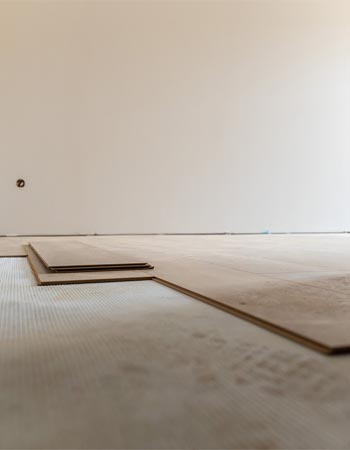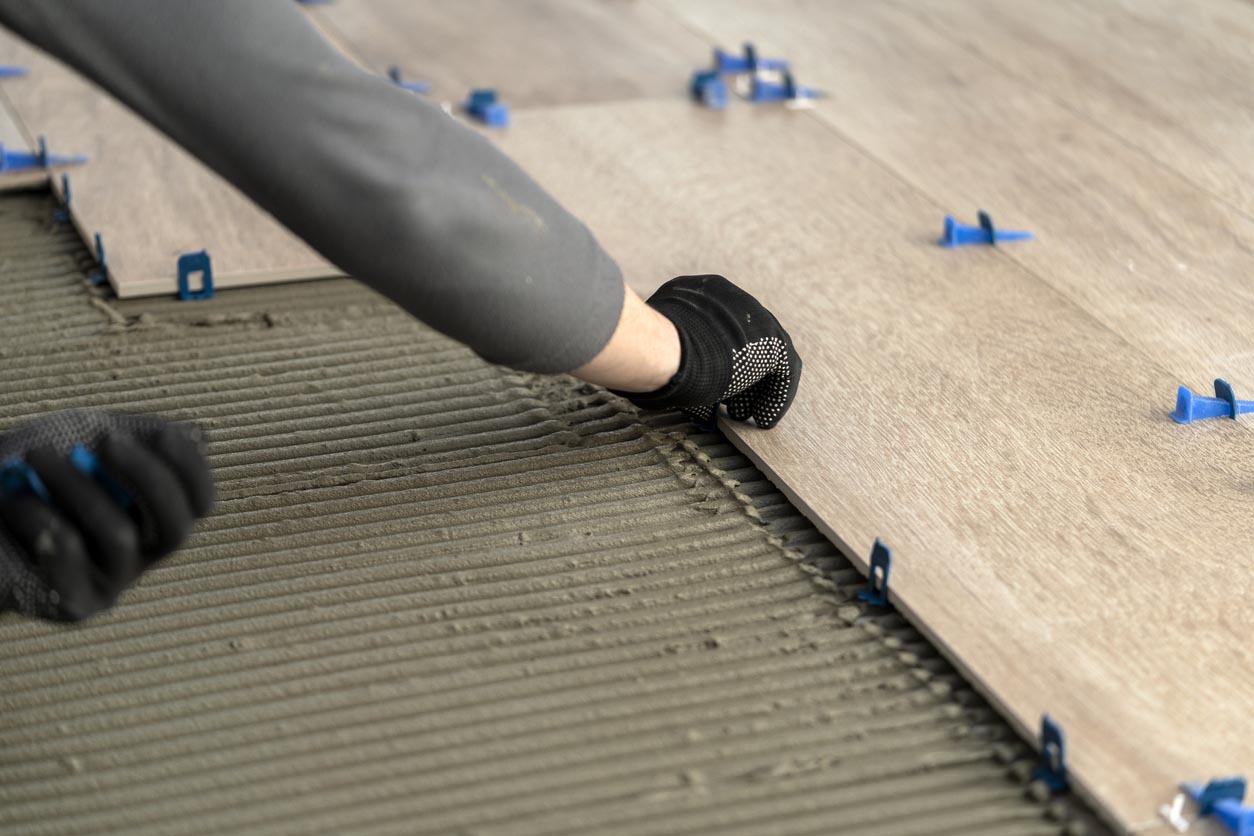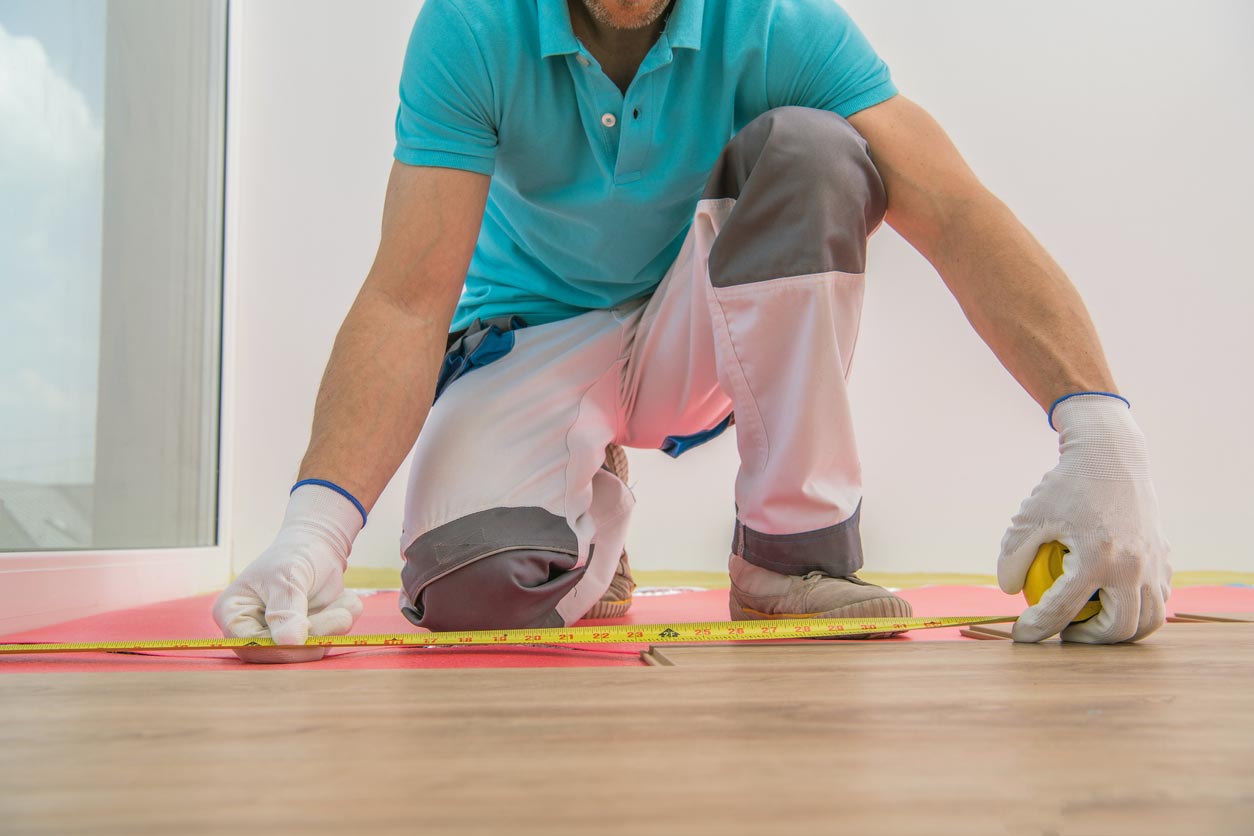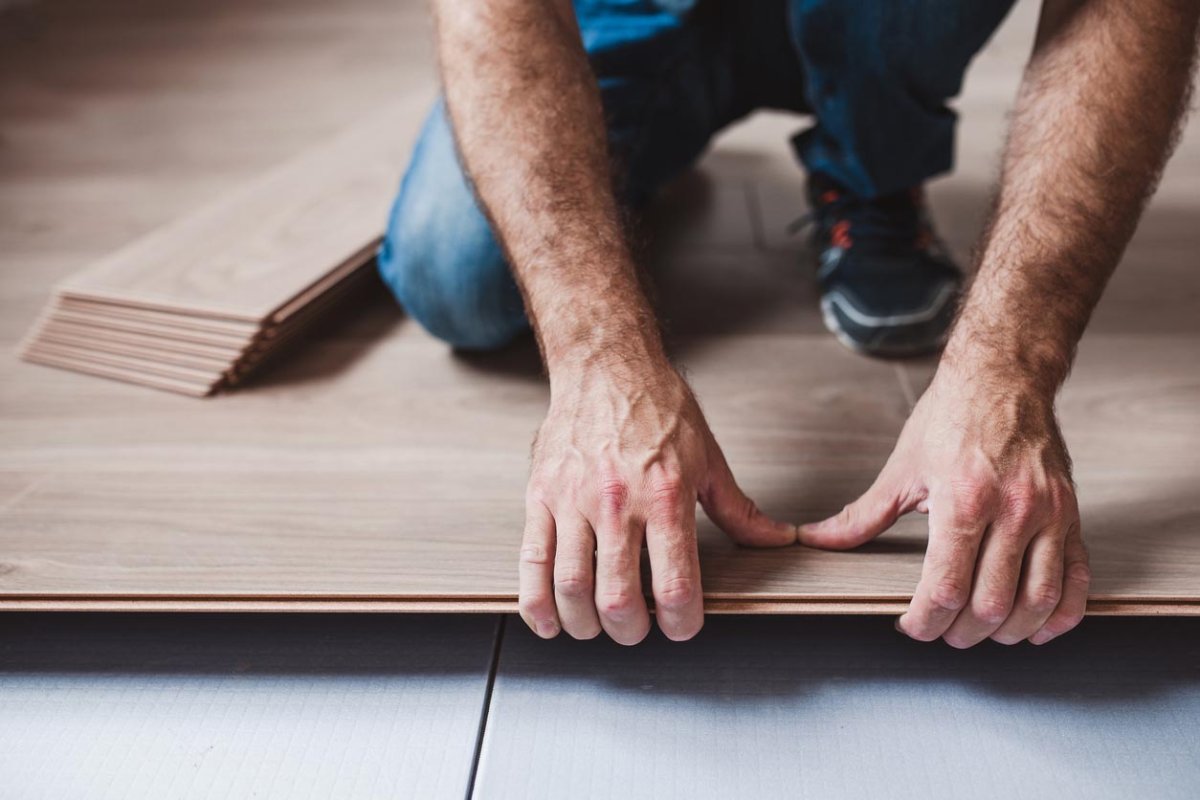We may earn revenue from the products available on this page and participate in affiliate programs. Learn More ›
A fresh new floor can completely change the look of a room, and even an entire home. Quality flooring is an investment, so the wise homeowner shops around to compare options and pricing to find the best balance of quality and cost. Unfortunately, sticker shock can make it tempting to go with a flooring company that will charge less, but often those companies don’t cost less in the long run: If a deal looks too good to be true, it probably is. Installers whose prices are shockingly below the average may be employing tricks and tactics to upcharge their customers in other ways or even take their deposits and disappear entirely. Flooring scams are not uncommon, so knowing how to protect yourself against shady practices and learning how to choose a reputable contractor can result in a beautiful, updated floor at a reasonable cost.

Carpet, hardwood, vinyl, and tile flooring.
Bob Vila has partnered with Empire Today to help you easily get beautiful new floors at a great price.
Free In-Home Estimates
6 Sneaky Scams Employed by Dishonest Flooring Installers

It can be hard to tell whether a flooring installer is doing honest business or is trying to scam a vulnerable customer. Finding a trustworthy contractor can be tricky, especially with so many types of flooring scams that exist. Homeowners can catch early signs of scams by doing their due diligence throughout the buying and installing process. These are some of the most common scams to watch for. If a red flag pops up, the best defense is asking questions, pushing for answers, and knowing when to cut ties with an installer that may not be totally honest.
1. Fudging the flooring measurements so you pay more for materials.
This can actually be one of the toughest scams to identify. Why? Because responsible flooring and carpet contractors should actually order more material than the strict measurements of the area to be covered demand. Ordering “overage” allows contractors to match patterns, install carpet with the grain in the correct direction, and cut neatly around awkward corners. This practice also leaves a little leeway for the occasional bit of damaged product and for accidental miscuts without the installer needing to reorder material (and hope it’s all from the same color lot). An honest and thorough installer will measure the space, sketch out a floor plan, and then, using the sketch and the measurements of the space, draw in the seams and cuts that will be necessary to cover the floor. Depending on the type, flooring may come in rolls, sheets, boxes of planks, or tile, and the contractor should be able to estimate—and show the customer—how the selected flooring can be maximized.
To tell if you’re being scammed, you may need to do your own measuring and some math to see how much flooring you will need. Once you’ve found the magic number, you’re in a position to question the installer about the amount of flooring they want to order. If it seems excessive, ask for an explanation and to see their sketch showing the seams and cuts that will be necessary to make sure that waste cuts are being used to fill spaces. An installer who wants to order 5 percent more than the total square footage is likely being prudent. However, if the installer wants to order much more than that, you may want to get in touch with another expert. Some flooring companies offer a free or low-cost measuring service, even if the customer ultimately ends up going with a different company. Getting a second professional opinion on the measurements can help put your mind at ease or confirm your suspicions that you’re being taken advantage of. In the end, if a customer feels that the measurements provided by the installer don’t match the amount of materials needed and no explanation is provided, it’s wise to seek a quote and measurements from a more reputable company.
2. Providing samples that are of a higher quality than the actual product.
Flooring salespeople often present customers with large sample books that display all of the flooring materials they have on offer. Customers can select a material based on color, quality, and feel. If the flooring company is honest, the quality of the swatches in the book will be the same as the flooring they deliver. Unfortunately, some installers scam customers by charging them for the high-quality sample they selected only to install a product that is cheaper and of a much lower quality.
The samples usually have codes and identification numbers on the back or on a label attached to the specific swatch. To avoid falling for this scam, it’s worth taking note of the code associated with the sample you selected, then cross-referencing the order form and contract. You’ll want the codes or identification numbers to match. As an added precaution, you may want to check the code of the flooring materials when it arrives for installation.
If the identification numbers don’t match, or you otherwise suspect that the quality of the flooring you received is not the same as the quality of the sample you selected, don’t allow the installation. It’s best to ask the installer to verify that this is the flooring ordered per your contract. This is worth asking in the scenario that you receive lower-quality flooring than the one you ordered, but it’s just as worth it if the materials received are higher quality than what you ordered. In this case, it’s likely that you will be charged for this upgrade.
3. Making your deposit disappear.
A deposit serves as a financial contract between a customer and a contractor. It ensures that the customer is serious about employing the contractor and that the contractor will provide quality workmanship in order to receive the full payment at the end of the job. Putting down a deposit is a common practice, and in many cases, it is standard for flooring installers to request a deposit of around 10 percent of the project cost. Often, legitimate flooring companies will carry insurance to protect them against customers who bail out on the contract after materials have been ordered, so the customer should not be expected to provide a significant deposit or pay in full before the job is complete.
However, dishonest contractors may ask for a substantially larger deposit or require the customer to pay in full before the project begins, then disappear. “If the flooring contractor asks for money up front before you both sign a contract with project beginning and end dates, consider this as a red flag,” warns Alyssa Trautman, an interior designer at Floor 360, a flooring store based in Wisconsin. “These scammers often ask for a larger sum of money as part of a get-rich-quick tactic, and often demand payment in cash or a personal check. Once the scammer receives the deposit, they disappear. Phone calls go unanswered, the money is gone, the product isn’t ordered, and the job never gets done.
When a flooring contractor asks for a deposit, customers can safeguard against a scam by taking a few precautions:
- First, vetting the contractor carefully and making sure that reviews from other customers on social media (and even the Better Business Bureau) are generally positive is a good first line of defense. Customer complaints can reveal a lot about the contractor’s work ethic, practices, and reliability.
- Second, ask for a written and signed contract that includes the specific materials to be ordered and installed, the cost of the labor, the total cost of the project, the timeline, and contact information for the contractor. Ask for copies of the contractor’s license and insurance information before putting down a deposit.
- An excessive deposit amount can be a red flag, so understanding the norm for contractors in your area is a good step to take. The deposit is best paid by a debit or credit card so it is traceable. Once paid, ask for a valid receipt. These are all measures that can help your bank recoup your funds if you do become the victim of a flooring scam.

4. Advertising deals that are too good to be true.
There are a few points during the year when flooring deals are worth considering, and these are typically the best times to buy flooring. But it’s worth being wary of flooring companies and installers that offer deals that seem too good to be true for the simple reason that low prices can be deceiving. In these cases, it’s likely that scammers will opportunistically pile on fees and additional costs that end up negating the initial deal. By the time all those costs are added up, it’s too late for the customer to back out of the contract.
“The most common scam is the ‘whole house carpet installation for one low price’ or ‘$79 for a whole home carpet installation,’ or similar.,” explains Trautman “What the flooring dealer or big box store is doing is inflating the cost of materials, pads, and extras. Or even worse, sending out inexperienced carpet installers who don’t charge much by the hour. Qualified experienced installers charge more for labor because they are charging for the knowledge and experience they are bringing to the project.”
Even legitimate flooring companies and installers can prey on customers and take advantage of the fact that flooring is an expensive improvement by advertising deals that seem too good to be true. While not a scam in itself, they use a “bait and switch” strategy to get customers interested in their services. Often, they will advertise unusually low prices for a complete installation. Customers investigate the deal and often find that the quality of the materials may be lower than they would like. However, at this point, the installer can take advantage of the fact that the customer has their proverbial “foot in the door,” and they can now turn the customer’s attention to more expensive materials and upsell them.
In addition to knowing what a “too good to be true” deal looks like, having a budget in mind before going to a showroom or talking to a professional can help you safeguard against being upsold. It’s also worth thinking about whether or not you’d want to work with a company or individual that uses these dishonest tactics.
5. Quoting low, then overcharging.
Many homeowners considering a flooring project will seek out quotes or bids from several flooring companies or installers. This is a wise approach—as long as the cost isn’t the only deciding factor and the contracts that are offered are complete.
Ultimately, the most responsible contractors will make a competitive bid that includes costs for material, labor, and any permits that are required, and leave a little room in the budget for the unexpected. Contractors can also expect that the competition will do the same, so some will make their bid more appealing by reducing their profit; this usually ends up cutting costs on labor or offering a quicker turnaround.
However, shady contractors will offer a lowball cost estimate to convince customers to choose them. Then, once the project is underway and the customer is locked in a contract, the contractor will add on costs: more labor, more materials, more time. The customer might end up paying significantly more than originally planned (and more than what they would have paid had they selected a different company or professional). What’s more, if this is the contractor’s approach, there’s a higher chance that the work will be of lower quality.
Homeowners looking to redo their floors might be tempted to choose the lowest quote, but ultimately, it’s not automatically the best one to choose. It’s important to note that a low bid isn’t always a scam—sometimes it’s just the lowest bid. In fact, if the installer has a great reputation, can show examples of their work, and offers a complete and carefully written contract, then a low bid is a plus. However, if a quote is substantially lower than the others, the installer can’t provide references, and the contract is vague or nonexistent, then it’s a good idea to choose a different provider. The best way to protect against this scam is to require a detailed, signed contract up front and to hold the installer to that contract. Unless there is a significant surprise (for example, termites or significant rot is discovered in the subfloor and additional time and expense is required to replace the subfloor), the installer’s misjudgment or miscalculation of labor costs or material costs should not add to the contracted cost.
6. Making false claims about their products.
Flooring materials can have a lot of different features, options, and customizations that customers simply have to accept as being true, such as stain and scratch resistance or odor neutralization. Unless they’re flooring experts themselves, most people won’t necessarily be able to know with 100 percent certainty that their chosen flooring material actually possesses any of these qualities or characteristics. In fact, it can be years before the customer realizes that their floors are not what they ordered or expected and that ultimately, they paid more for a floor with certain characteristics without actually benefiting from them.
This is also a scam that can be avoided by having clear contracts with material identification numbers and codes that can be cross-referenced with the codes on the materials received.

5 Foolproof Ways to Vet a Flooring Installer Before Hiring
Choosing a reliable contractor can mean the difference between losing both time and money and having high-quality floors that will last for years. It’s easy for customers who don’t know what to look for to fall for a scam, but the good news is that it’s just as easy to follow five core practices to avoid falling for a fraudulent contractor or company.

Carpet, hardwood, vinyl, and tile flooring.
Bob Vila has partnered with Empire Today to help you easily get beautiful new floors at a great price.
Free In-Home Estimates
Get at least 3 quotes to compare prices.
Even if your neighbor had a great experience with a contractor and has shown you their beautiful floors, request estimates from at least three other contractors, if not more, before choosing. Make sure you’re getting the same information in each quote so you can accurately compare them: material costs for comparable products, labor costs, and a time frame for completion. Don’t assume that the lowest quote is the best or that the highest is unreasonable, because the cost is just one factor in this decision—and not the only one. Having multiple quotes can help you understand how much the project will ultimately cost and potentially identify scammers in the process.
Ask for and contact references who can speak to the company’s legitimacy.
A reputable contractor will typically be willing to refer potential customers to former customers, though it’s worth bearing in mind that they will generally only provide the contact information of satisfied customers. It’s important to reach out to the references and ask questions about the work provided, and, very importantly, to see photos of the final result. Ask specifically for references from homeowners whose projects were similar to your own. It’s great that the installer did excellent work on someone’s hardwood, but if your project is tile or wall-to-wall carpeting, the hardwood installation job isn’t comparable.
Read online reviews of the companies that you’re considering (and keep an eye out for fake reviews).
Because a contractor will direct customers to positive reviews, it’s a good idea to check online reviews as well. Checking the Better Business Bureau as well as your state’s consumer protection department records for complaints and resolutions is a good place to start. However, it’s important to consider online reviews cautiously, especially those that were made anonymously. Positive reviews that are overblown and extreme could be fake, planted by the company itself. Some extremely negative reviews may have been written by rival installers or even a single disgruntled customer. Reviews can also be misleading; if a customer is unhappy with their flooring choice, that isn’t necessarily the fault of the installer, who may have done fine work. But the general trend of online reviews should give you an idea of the kind of work the installer does and is another component in a customer’s evaluation of the contractor overall.
Verify that contractors are both licensed and insured.
Contractors should be able—and even willing—to provide evidence of current licenses and insurance. In many states, customers can access the state licensure boards online and check to make sure the contractor’s license is current. However, it’s not unreasonable to ask for a copy of the professional’s license and insurance with the contract for your records. In states that don’t require licensing, proof of insurance is still important. In the absence of licensing, it can be beneficial to confirm the contractor’s membership in professional organizations or certification boards.
Get a contract for the work in writing and review it thoroughly.
Getting a contract for the work in writing is perhaps the most important step, and it’s the best way to protect against financial loss in the event of a scam. Prior to paying the deposit, if there is one, customers will want to ask for a complete and written contract, preferably on formal letterhead from the company. This is not the same as an estimate; a contract is a binding document that indicates how much the customer will pay and exactly what they should expect in exchange. Specificity about the details is best: an outline of the expected timeline, the codes of the materials that will be ordered, and an itemized flooring installation cost breakdown are signs of an honest contractor or company. Ideally, a contract includes:
- The rooms in which floors are being replaced;
- The cost of removing and disposing of the existing flooring;
- A list of specific materials and their amounts (the type of flooring, the number/name of the flooring to be ordered, underlayment, padding, tack strips, new molding, thresholds, finishing work, grout, etc.);
- The timeline of the project and an anticipated completion date;
- The cost of labor;
- The party responsible for covering the cost if more flooring needs to be ordered; and
- How disputes or unanticipated problems will be managed.
Because flooring replacement usually involves opening up a part of the home that has been covered for some time, there is always the possibility that problems or surprises will arise during the project. Those are legitimate reasons that costs might exceed what is stated in the contract, especially if asbestos or rot is discovered underneath the existing floor. But a complete contract will protect the customer from unjustified additional costs. And should the contractor just disappear, it will provide grounds for legal action if necessary.
Choosing an established flooring company with a great reputation is the best way to avoid flooring scams.
There are many independent contractors and small businesses that are legitimate and trustworthy. However, there are also many dishonest professionals who use fraudulent practices to scam their clients out of more money. Knowing what to look for—and what to avoid—when hiring a flooring company or installer can help customers protect their time and money. Choosing an established company with a good reputation is a near-surefire way to ensure that the services provided will be of quality, and the materials will be as expected.
“Use a flooring contractor through a trusted locally owned and operated flooring showroom where you would purchase materials and receive an installation warranty,” advises Trautman. “They have vetted the installers and likely have used their services for many years. Check the reviews of the company you are looking into to see feedback from other customers on their installations and overall experience.”
The best flooring companies, such as Empire Today, don’t engage in shady practices and have legions of happy customers. With many decades in the business, these companies have proven themselves time and again as trustworthy. They can also provide free tools and resources to help customers make the best decision for themselves and their homes. From in-home visualizers to informational posts about their offerings, these companies are worth considering for any flooring project.
- Read the BobVila.com Empire Today review.

Carpet, hardwood, vinyl, and tile flooring.
Bob Vila has partnered with Empire Today to help you easily get beautiful new floors at a great price.
Free In-Home Estimates


